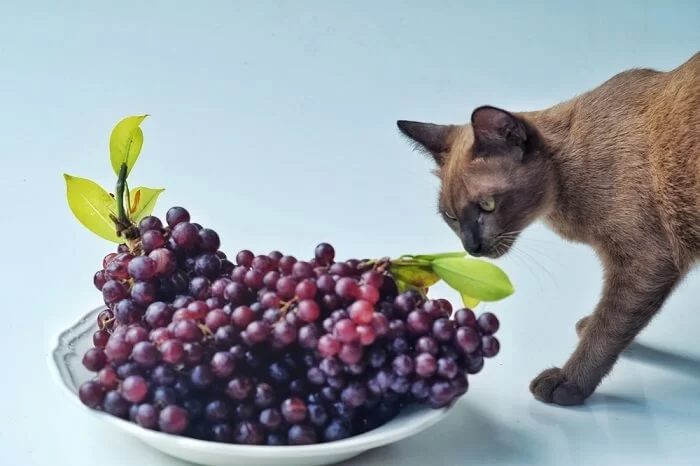Can Cats Eat Grapes or Raisins? Understanding the Risks
As a responsible cat owner, you’ve probably wondered whether certain foods are safe for your feline friend. One common question that arises is whether cats can eat grapes or raisins. These fruits are often enjoyed by humans as a snack, but for cats, the situation is a bit more complicated. In this article, we’ll explore the potential risks of grapes and raisins for cats, including how they might affect your cat's health, and provide advice on what foods are safe for your furry companion.
The Dangers of Grapes and Raisins for Cats
While grapes and raisins are commonly consumed by humans without any problems, they are known to be toxic to some animals, particularly dogs. But what about cats? Research on the effects of grapes and raisins on cats is limited, but many veterinarians agree that these fruits can cause serious harm to cats, even in small amounts. The exact reason why grapes and raisins are toxic to certain animals remains unclear, but they can cause kidney failure, a life-threatening condition in cats.
Signs of Grape or Raisin Toxicity in Cats
If a cat consumes grapes or raisins, it may not show immediate symptoms. However, toxicity can lead to delayed signs, such as vomiting, diarrhea, lethargy, loss of appetite, and abdominal pain. In severe cases, kidney failure can occur, which can be fatal if not treated promptly. It’s important to act quickly if you suspect your cat has ingested grapes or raisins, even if they only consumed a small amount.
What Should You Do If Your Cat Eats Grapes or Raisins?
If your cat eats grapes or raisins, the first step is to contact your veterinarian immediately. Early intervention is crucial in preventing serious health issues. Your vet may induce vomiting to remove the grapes or raisins from your cat's system, or they may administer activated charcoal to prevent further absorption of toxins. In some cases, your cat may need to be hospitalized for monitoring and supportive care, especially if symptoms of kidney failure develop.
Are There Any Safe Alternatives to Grapes and Raisins for Cats?
While grapes and raisins should be avoided at all costs, there are plenty of safe and healthy treats for your cat. Fresh fruits like blueberries, watermelon, and cantaloupe are generally safe in small amounts and can provide a refreshing snack for your cat. However, always be sure to remove any seeds or pits before offering them to your pet. Additionally, many pet stores offer specially formulated cat treats that are both nutritious and safe for feline consumption.
Real-Life Story: A Scare with Raisins
One cat owner, Sarah, shared her experience after her curious kitten, Whiskers, managed to snatch a handful of raisins from the kitchen counter. Sarah didn’t realize the potential danger until Whiskers started vomiting and became lethargic just a few hours later. Panicking, Sarah rushed Whiskers to the emergency vet, where the staff immediately treated him with activated charcoal. Thanks to the quick response, Whiskers recovered fully and went on to live a long, healthy life. This incident served as a stark reminder of how important it is to keep harmful foods out of reach of our pets.
Safe Diet Tips for Your Cat
When it comes to feeding your cat, it’s best to stick to a balanced, nutritionally complete cat food. Cats are obligate carnivores, meaning they thrive on a diet that primarily consists of meat. Avoid feeding your cat human foods, as many of them can be harmful. If you do want to offer your cat treats, make sure they are specifically designed for felines and follow the recommended serving sizes.
In addition to feeding your cat the right food, ensure they always have access to fresh water. Hydration is essential for your cat’s health, particularly for preventing kidney issues. If you’re ever unsure about a specific food, it’s always best to consult your veterinarian for guidance.
Common Toxic Foods for Cats to Avoid
Besides grapes and raisins, there are several other foods that are toxic to cats. Some of the most common include:
- Onions and garlic: These can cause digestive upset and damage red blood cells, leading to anemia.
- Chocolate: Theobromine in chocolate is toxic to cats and can cause symptoms such as vomiting, diarrhea, and seizures.
- Alcohol: Even small amounts of alcohol can be dangerous to cats, causing liver and brain damage.
- Caffeinated beverages: Caffeine can lead to restlessness, rapid breathing, and heart palpitations in cats.
- Xylitol (found in sugar-free gum and candy): This artificial sweetener can cause a sudden drop in blood sugar levels and liver failure in cats.
Being aware of these potential dangers and taking precautions to keep harmful foods out of your cat’s reach is one of the most important steps in ensuring their health and well-being.
Final Thoughts on Feeding Cats Safely
When it comes to your cat’s diet, always remember that their needs are different from yours. While grapes and raisins are safe for humans, they can be deadly to cats. Keep these foods, as well as other toxic items, out of your cat’s reach to help protect them from potential harm. By providing a balanced diet, safe treats, and plenty of water, you can ensure that your cat leads a happy and healthy life.












